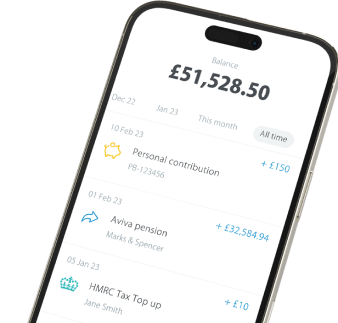
If you’ve worked for a company in the past decade, it’s likely you were automatically enrolled into its pension scheme. Under the government’s Auto-Enrolment rules, eligible employees will have 8% of their qualifying earnings (5% from the employee and 3% from the employer), paid into their workplace pension. But what happens when you’re self-employed?
Self-employment gives you the opportunity to set your own hours, decide the projects you want to work on, and be in charge of your own career path. Around 13% of the UK workforce is self-employed.). This could be anything from being a Tutor to a Photographer or Web Designer. With self-employment comes the responsibility to set up and save into your own pension. While around 80% of eligible employees are Auto-Enrolled in their workplace pension scheme, just 16% of self-employed workers choose to pay into a pension for their retirement.
Here’s a countdown of the 12 most common self-employed jobs in the UK according to Indeed, the average salaries each job could receive, and how making pension contributions equivalent to 8% of salary could snowball into a happy retirement. The following scenarios are for illustrative purposes only and assume:
- A salary increase of 2.5% each year, from the 2023 average job title salary
- Regular contributions of 8% gross salary into one defined contribution pension
- Each pension experiences investment growth of 5%, inflation of 2.5%, and an annual management fee of 0.7% each year.
12. Tutor
The Tutor’s Association estimates there are up to 100,000 private tutors in the UK (1). Tutors use their knowledge to privately teach a particular subject to adults learners or children studying towards an exam. In 2023, the average UK salary for a Tutor’s £36,191 per year (2).
Tutors saving 8% of their gross annual salary would have pension contributions worth around £2,939 in the first year, and a pension pot of £32,751 after 10 years. After a 40-year career this could provide a pension worth £189,173.
11. Courier
Each day, over 11 million parcels are delivered in the UK (3) - that’s 132 parcels per second! Couriers travel across the country, delivering packages securely to businesses and households. In 2023, the average UK salary for a Courier’s £12,304 per year (2).
Couriers saving 8% of their gross annual salary would have pension contributions worth around £999 in the first year and a pension pot of £11,134 after 10 years. After a 40-year career this could provide a pension worth £64,314.
10. Social Media Manager
The UK’s home to an estimated 53 million active social media users (4). Social Media Managers create strategies and manage social media campaigns to increase brand visibility for businesses. In 2023, the average UK salary for a Social Media Manager’s £33,378 per year (2).
Social Media Managers saving 8% of their gross annual salary would have pension contributions worth around £2,711 in the first year and a pension pot of £30,205 after 10 years. After a 40-year career this could provide a pension worth £174,470.
9. Personal Trainer
Approximately 62% of British Personal Trainers are self-employed (5). Personal Trainers are fitness experts who plan an exercise regime and coach their clients towards a health goal. In 2023, the average UK salary for a Personal Trainer’s £28,493 per year (2).
Personal Trainers saving 8% of their gross annual salary would have pension contributions worth around £2,314 in the first year and a pension pot of £25,784 after 10 years. After a 40-year career this could provide a pension worth £148,935.
8. Web Designer
There’s almost two billion websites in the world and five billion active internet users (6). Web Designers use their user accessibility knowledge to design an engaging website for various audiences. In 2023, the average UK salary for a Web Designer’s £30,187 per year (2).
Web Designers saving 8% of their gross annual salary would have pension contributions worth around £2,452 in the first year and a pension pot of £27,317 after 10 years. After a 40-year career this could provide a pension worth £157,790.
7. Freelance Writer
According to Semrush, half of companies outsource content writing to independent freelancers (7). Freelance Writers multi-task assignments to write copy across formats and industries. In 2023, the average UK salary for a Freelance Writer’s £20,308 per year (2).
Freelance Writers saving 8% of their gross annual salary would have pension contributions worth around £1,649 in the first year and a pension pot of £18,378 after 10 years. After a 40-year career this could provide a pension worth £106,152.
6. Graphic Designer
The Creative Industries Council estimates that only 50% of design employees are educated to degree level (8). Graphic Designers use design tools to create brand assets, from logos to leaflets. In 2023, the average UK salary for a Graphic Designer’s £27,214 per year (2).
Graphic Designers saving 8% of their gross annual salary would have pension contributions worth around £2,210 in the first year and a pension pot of £24,627 after 10 years. After a 40-year career this could provide a pension worth £142,250.
5. Virtual Assistant
Data from the Office for National Statistics (ONS) revealed that around 14% of the labour market works exclusively from home (9). Virtual Assistants work remotely to support businesses in various administrative capacities. In 2023, the average UK salary for a Virtual Assistant’s £32,217 per year (2).
Virtual Assistants saving 8% of their gross annual salary would equal pension contributions worth around £2,616 in the first year and a pension pot of £29,154 after 10 years. After a 40-year career this could provide a pension worth £168,401.
4. Video Editor
The majority of film editing and television work’s based in London (10). Video Editors compile and compress digital video files to produce adverts or films. In 2023, the average UK salary for a Video Editor’s £27,927 per year (2).
Video Editors saving 8% of their gross annual salary would have pension contributions worth around £2,268 in the first year and a pension pot of £25,272 after 10 years. After a 40-year career this could provide a pension worth £145,977.
3. Event Coordinator
Every year almost 280,000 weddings take place in the UK (11). Event Coordinators organise and execute the logistics of important events, from award ceremonies to weddings. In 2023, the average UK salary for an Event Coordinator’s £24,965 per year (2).
Event Coordinators saving 8% of their gross annual salary would have pension contributions worth around £2,027 in the first year and a pension pot of £22,592 after 10 years. After a 40-year career this could provide a pension worth £130,494.
2. Photographer
Each year, over 1.81 trillion photos are taken worldwide (12) - that’s five billion per day! Photographers are hired on a freelance basis to capture moments such as professional headshots or sporting events. In 2023, the average UK salary for a Photographer’s £26,928 per year (2).
Photographers saving 8% of their gross annual salary would have pension contributions worth around £2,187 in the first year and a pension pot of £24,368 after 10 years. After a 40-year career this could provide a pension worth £140,755.
1. Labourer
Data from 2020 found that close to one in five self-employed people work in the construction sector (13). Labourers work on building sites to renovate or expand the architecture of a region. In 2023, the average UK salary for a Labourer’s £23,071 per year (2).
Labourers saving 8% of their gross annual salary would have pension contributions worth around £1,874 in the first year and a pension pot of £20,878 after 10 years. After a 40-year career this could provide a pension worth £120,594.
Figures provided are rounded to the nearest pound.
Which self-employed job could expect the biggest pension pot?
The biggest estimated pension pot belongs to a Tutor, worth a whopping £189,173! On the other end of the spectrum, a Courier has the smallest estimated pension pot at £64,314. To add context, the average UK worker earns £33,000 (22), and could expect a pension pot of £172,494 using the same pension modelling. Here’s the projected pension pots of the 12 most common self-employed jobs in the UK:
If you’ve qualified for the full State Pension, you’ll currently receive £203.85 per week, or £10,600 a year (2023/24). Depending on what your happy retirement looks like, you’ll need at least a modest amount of personal pension savings to retire comfortably. In fact, the Pensions and Lifetime Savings Association’s Retirement Living Standards gives us an idea of how much a single person needs in retirement: the minimum living standard requires about £13,000 a year, a moderate lifestyle costs around £23,000, and a comfortable lifestyle is around £37,000.
As you can see, the State Pension alone isn’t enough to support even a minimum living standard. You can try our Pension Calculator to see how much income your pension could generate in retirement, and the impact of making regular or one-off contributions. Having savings in a personal, workplace, or self-employed pension can help fill that income gap and support a moderate or comfortable lifestyle. While self-employment rates have been rising over the past decade, the pension savings of this group aren’t keeping pace and there’s now a self-employed pension gap.
Introducing an Auto-Enrolment scheme for the self-employed could be a simple way to help close the pension gap between employed and self-employed workers. The Financial Resilience All Party Parliamentary Group has advocated for this legislation in its financial resilience report on UK households. In the meantime, if you’re self-employed and want to start contributing to a pension, PensionBee’s self-employed pension gives you the flexibility to make contributions that work for you. You don’t need to worry about minimum contributions, so you can contribute an amount that fits your budget as often as you’d like.
Footnotes
- Tutor’s Association: https://thetutorsassociation.org.uk/
- Indeed: https://uk.indeed.com/career-advice/finding-a-job/self-employed-jobs
- Shiply: https://www.shiply.com/articles/uk-delivery-and-courier-industry-statistics
- Cybercrew: https://cybercrew.uk/blog/social-media-statistics-uk/
- Healthily Toned: https://www.healthilytoned.com/single-post/self-employed-vs-employed-fitness-instructors
- Techjury: https://techjury.net/blog/how-many-websites-are-there/
- Semrush: https://www.semrush.com/blog/category/content/content-creation/
- The Creative Industries: https://www.thecreativeindustries.co.uk/facts-figures/industries-design-design-facts-and-figures-the-value-of-the-uk-design-industry
- Office for National Statistics: https://www.ons.gov.uk/employmentandlabourmarket/peopleinwork/employmentandemployeetypes/articles/ishybridworkingheretostay/2022-05-23
- Prospects: https://www.prospects.ac.uk/job-profiles/film-video-editor
- Photutorial: https://photutorial.com/photos-statistics/
- Office for National Statistics: https://www.ons.gov.uk/businessindustryandtrade/constructionindustry/articles/constructionstatistics/2020
Risk warning
As always with investments, your capital is at risk. The value of your investment can go down as well as up, and you may get back less than you invest. This information should not be regarded as financial advice.






